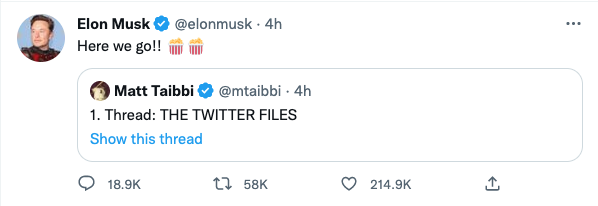Elon Musk reminded his followers on Friday that owning Twitter now means he controls every aspect of the company — including what its employees said behind closed doors before he took over.
Earlier this week, Musk teased the release of the what he called “The Twitter Files,” saying the public “deserves to know what really happened” behind the scenes during the Twitter decision to stifle a Hunter Biden story in 2020.
On Friday night, Musk delivered, sort of. Twitter’s new owner shared a thread from author and Substack contributor Matt Taibbi, who apparently already has a set of internal documents that he’s painstakingly chosen to share one tweet at a time in narrative form.
Taibbi noted on his Substack that he had to “agree to certain conditions” to land the story, though he declined to specify what the conditions were. (We suspect that sharing the documents in the form of a tweet to increase engagement on the platform must have been on the list.)

Taibbi’s decision to reveal a selection of the documents one tweet at a time was clearly not thorough enough. One screenshot, now deleted, posted Jack Dorsey’s private personal email address. Another shared an unredacted personal email belonging to Rep. Ro Khanna (D-CA), who expressed concern about Twitter’s action at the time. Both incidents seem contradictory Twitter’s policy against doxxing.
The documents, which are mostly internal Twitter emails, describe the chaotic situation that led Twitter to censor a New York Post story about Hunter Biden two years ago. In October 2020, The New York Post published a story that cited materials allegedly obtained from a laptop that the younger Biden had left at a repair shop. With the presidential election around the corner and the 2016 hacked DNC emails and other Russian election meddling on its mind, Twitter decided to limit the scope of the story.
Speaking to members of Twitter’s communications and policy teams, Twitter’s former head of trust and safety Yoel Roth cited the company’s rules on hacked content and noted the “serious risks and lessons from 2016” that influenced decision-making .
One member of Twitter’s legal team wrote that it was “reasonable” for Twitter to assume the documents came from a hack, adding that “caution is warranted.” “We just need more information,” he wrote.
In his Twitter thread, Taibbi characterizes the situation to take such a subsequent enforcement decision without consulting the company’s CEO as unusual. In fact, then-CEO Jack Dorsey was well known for not working at the company, sometimes working remotely from a private island in the South Pacific and delegating even high-level decisions of his political team.
After Twitter acted, the response from outside the company was swift — and apparently included one Democrat. “… In the midst of a presidential campaign, restricting the distribution of newspaper articles (even if the NY Post is far right) seems like it will cause more backlash than help,” Kana wrote to a member of Twitter’s political team.
Facebook took similar measures at the time. But Twitter was alone in its unprecedented decision to block links to the story, which ultimately sparked a firestorm of criticism that the website was tipping the scales for Democrats. The company, its former CEO and some policy executives have since described the incident as an error made out of caution, a story that is being verified in light of the recently released emails.
Musk hyped the release of the emails like a smoking gun, but they mostly tell us what we already know: that Twitter, fearing a repeat of 2016, took the unusual step of moderation when it probably should have provided context and let the story go to circulate. Musk has apparently choked up about it at least since April, when he called the decision to suspend the Post account “incredibly inappropriate.”
The files from the laptop will be later verified by other news outlets, but in the early days of the story, no one was able to confirm that the documents were genuine and not tampered with, including social platforms. “Most of the data obtained by The Post lacks the cryptographic features that would help experts make a reliable determination of authenticity, especially in a case where the original computer and its hard drive are not available for forensic examination,” the Washington Post wrote in your own email check history. The decision inspired Twitter to change its rules sharing hacked material.
Twitter’s former head of trust and safety Joel Roth shared more about the decision at interview earlier this week, noting that the story set off “alarm bells” signaling that it could be a hacking and leaking campaign by the Russian group APT28, also known as Fancy Bear. “Ultimately, for me, it didn’t get to a place where I was comfortable removing that content from Twitter,” Roth said.
Dorsey then admitted guilt in a roundabout way. “Blocking URLs outright was wrong and we’ve updated our policy and enforcement to correct,” Dorsey tweeted. “Our goal is to try to add context,” he said, adding that the company can now do that by labeling hacked material.
Since then, Musk has been busy with a handful of concrete solutions to content moderation before deciding to buy the company. His frustration that Twitter suspended conservative satire site The Babylon Bee over a transphobic tweet appears to be why he even decided to buy Twitter let’s start with
Now, two years after it happened, the Hunter Biden social media controversy is still a sore spot for conservatives, the right-wing media and Twitter’s new ownership. Previous controversies over the platform’s politics are largely irrelevant now with Musk at the helm, but he clearly still has an ax to grind with Twitter from the past — and we’re seeing it play out in real time.

